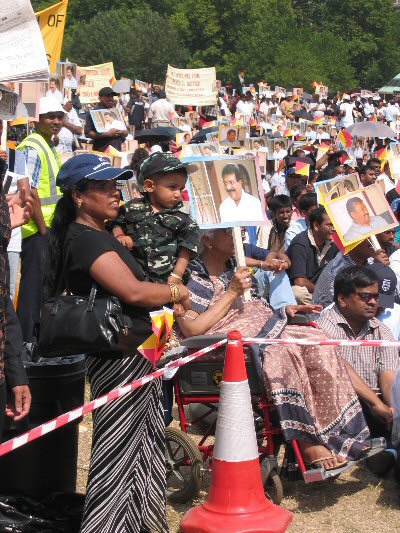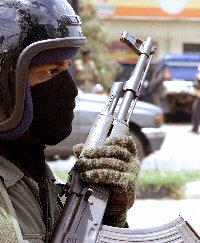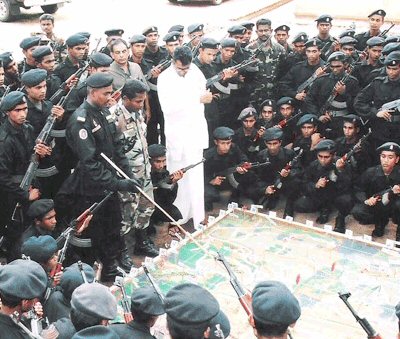The debate on Sri Lanka in Britain’s Parliament on May 2 resulted from two impulses: firstly, the UK government’s increasing interest in playing a role in ending Sri Lanka’s conflict and, secondly, the persistent lobbying and activism of the Tamil Diaspora.
The wide ranging debate saw parliamentarians from the ruling Labour party and the Liberal Democrats, the third largest party in Britain taking strong pro-Tamil positions. They were several calls for the ban on the LTTE to be lifted. The main opposition Conservative party and the UK government itself condemned the LTTE as terrorists.
All sides condemned the worsening human rights situation in Sri Lanka.
It was argued that the Sri Lankan state had failed to meet Tamil aspirations. Some MPs outlined the decades of repression and oppression of the Tamils by successive Sri Lankan governments.
But there was a key omission from the debate: that the Tamil people’s right to self-rule must be supported.
This cardinal issue must be dealt with squarely if Sri Lanka’s bitter conflict is to be ended.
Firstly, it is the inalienable right of the Tamil people to determine our own political destiny, to govern ourselves, to be free.
Secondly, the ground reality in Sri Lanka is that of two states – the Sinhala dominated, recognised state and the de-facto LTTE run administration in Vanni. The avoidable reality of two separate armies, navies and, now, air forces cannot simply be wished away.
The international community’s unqualified commitment to the territorial integrity of Sri Lanka, irrespective of the conduct of the state towards the Tamils simply ignores these two aspects.
This very point was raised in the fourth report of the British Parliamentary Foreign Affairs committee published two days after the debate on Sri Lanka (and independently of it).
The report includes British experts’ opinion that a key problem in resolving Sri Lanka’s conflict is that the bargaining power of the LTTE had not been recognised by the Sri Lankan government and the international community.
According to a British security expert cited by the report, “all the negotiating pitches and all the encouragement from the international community - from India and so on - have been in relation to returning Sri Lanka to, or maintaining, the territorial or nation state status of the country.”
“This effectively means that the LTTE's bargaining position is very strong, but the level at which it is being asked to negotiate is actually much lower.”
“Effectively what [the LTTE] is being asked to do is go back to the situation before [the war began in] 1983 and the status quo ante, which of course the LTTE is never going to do. It is never going to do it when it also knows that it has broken the monopoly of force once controlled by the Sri Lankan Government.”
Experts from a leading British security think tank, Chatham House, went on to tell the foreign affairs committee that “practical political issues on the ground” had simply been “overlooked or ignored by the international community.”
Tellingly, they pointed out: “we know the international community has problems when it comes to looking at partition, confederation and so on. Of course it does.”
Indeed, for decades, the Tamils have listened with dismay as leading countries including the United States, Britain and others have repeatedly reaffirmed their commitment to Sri Lanka’s territorial integrity (while also asserting commitment to the principles of democracy and freedom).
This is especially so, because, firstly, this entails the LTTE must simply – irrespective of the Sri Lankan state’s preparedness to address Tamil grievances - surrender the bargaining power it has acquired;
And secondly because a state’s territorial integrity is not an inviolable principle of international politics - as is amply demonstrated by US and UK policy in other international contexts (Kosovo, Eritrea, etc).
Although the Tamils in Britain have repeatedly come in for praise as model citizens by various establishment figures, UK foreign policy has never taken into account the deeply held political convictions of the local Tamils.
Instead British foreign policy has been driven by Western geopolitical and economic interests.
For example, despite repeated protests by the Tamil Diaspora - and international human rights groups - of widespread rights abuses by the Sri Lankan state, Britain this year alone sold more the £7 million of arms to Colombo (and that despite a policy that weapons should not be sold to countries where they could be used for internal repression).
At the same time, hundreds of thousands of Tamil languish in refugee camps in the government-controlled east and the half-million residents of Jaffna struggle to obtain essential supplies. Amid deafening international silence.
If Britain wishes to play a role in producing a just and lasting peace in Sri Lanka, the Tamils must now ask for this one-sided and selfish policy to change.
True, there were calls in the Parliamentary debate for the ban on the LTTE to be lifted in order to facilitate efforts towards peace.That this matter is raised so forthrightly in the British Parliament is welcome and testament to the efforts of Diaspora lobbyists.
But it is a basic step for an honest peace broker.
To begin with, international proscription has hardly been a resounding success. In the past few years, despite bans and several other ‘unofficial’ restrictions, the LTTE has raised money abroad and built up its military and civil administration.
And the bans have encouraged the Sri Lankan state to violence anew. Colombo is now aggressively and unabashedly prosecuting a major war against the LTTE, inflicting widespread misery on the Tamils in the process.
As ever, there is a large gap between the rhetoric of the international community and its actions.
While criticising the human rights abuses by the Sri Lankan government, Britain along with the US and India, have been providing Colombo with military, financial and political backing.
In short, the pro-Tamil opinions expressed in the UK Parliament must be measured against tangible British action.
Going forward, the key issue for the Tamils must be the unqualified international support for Sri Lanka’s territorial integrity.
Whilst adamantly insisting that the Sinhala-dominated state’s territorial integrity be maintained, the international community simultaneously insists that the political solution to the conflict is an ‘internal matter.’ It can’t have it both ways.
Last year Britain’s High Commissioner to Sri Lanka, Dominic Shilcott, admitted that the constitutional safeguards Britain left behind to protect the minorities proved woefully adequate against the Sinhala chauvinism which captured the post-independence state early on.
And that was long before the LTTE was formed.
Last week Conservative Member of Parliament Mr Clifton Brown, lambasted the LTTE before noting, with characteristic British understatement: “political representation for the Tamil minority in Sri Lankan politics is another issue. If Sri Lanka is to be capable of creating a long-term and peaceful solution to its problems, engagement in an inclusive political process is essential.”
Today it is blatantly obvious that the Sri Lankan military violates Tamils’ rights with absolute impunity, that the state bureaucracy is racist, that the politicised judiciary and corrupt police are no recourse for the minorities.
It follows that the Sri Lankan state has forfeited its right to the allegiance of the Tamil people and that the latter, exercising their right to self-rule, must decide what form of governance, including independence, they now want.
And this is the only position that is consistent with the lofty ideals extolled in Britain’s Parliament.
Shirking from commenting on a solution to Sri Lanka’s war, Mr. Brown however maintained: “I do not want to get into the internal politics of Sri Lanka—that is not our business.”
It is however the business of the Tamil Diaspora. As Mr Simon Hughes, speaking on behalf of the Liberal Democrats party, told Parliament: “the Tamils told me that they wanted to make their own decisions, too, and that is a laudable and honourable objective.”
He went on to say: “there should be a suitable degree of autonomy within a peaceful, secure and stable Sri Lanka. If later the Tamil people voted for independence in a free election - unharassed and without any pressure - that would be a separate issue.”
The world, he said, “would have to accommodate that [wish] through proper international recognition processes.”
“It is absolutely not for me, from here, to prescribe whether there should be a federal state or a confederal state, but I am absolutely clear that a unitary state with no proper devolution beyond what has been offered so far will not work.”
The point Mr. Hughes was making is that the Tamils must negotiate an interim solution within a united Sri Lanka – with international support.
But the Tamils cannot have faith in any internationally backed peace process unless it begins with parity of negotiating power between the Tamil and Sinhala peoples.
It is not a question of relative military power or not, but one of mutual ethnic respect.
Ergo, if there cannot be international support for an independent state, there shouldn’t be backing for a united one either: both must be possible outcomes even if the Tamils are encouraged to opt for something short of independence.
A balanced framework for negotiation involves accepting every outcome including partition as a possibility.
If Britain is to play any honest part in resolving Sri Lanka’s conflict resolution, London needs to explicitly accept that the territorial integrity of Sri Lanka cannot be a pre-condition for the Tamils.
This is not only because such a position is consistent with the principle of an ‘internally’ forged agreement, but because it is the premise for a just solution.








